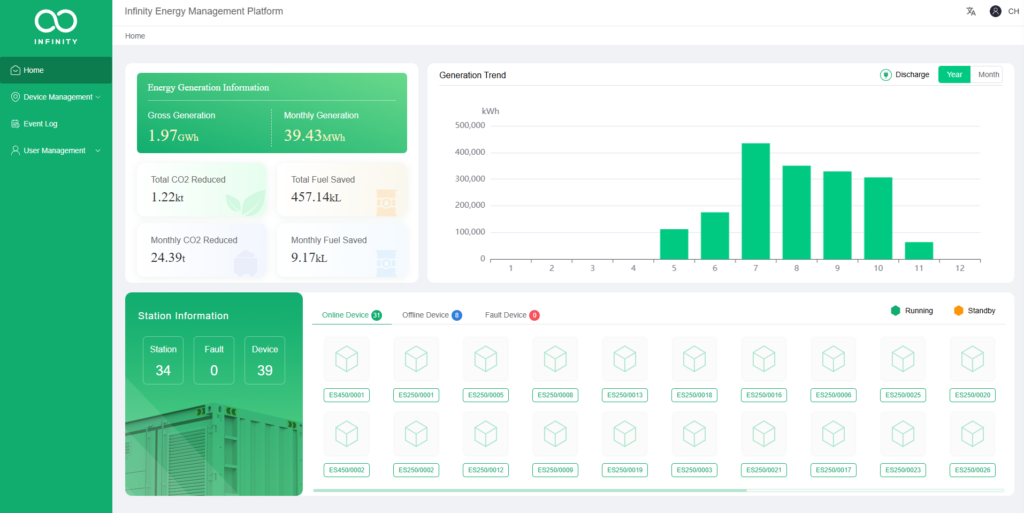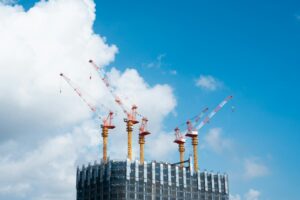As Singapore tightens its climate policies, carbon reporting is no longer optional especially for large construction projects. From SGX’s FY2025 climate-related disclosure rules to the National Environment Agency’s (NEA) GHG reporting guidelines and the goals of Singapore’s Green Plan 2030, the pressure is building on developers, main contractors, and equipment rental companies to measure, manage, and reduce emissions.
The shift toward mandatory carbon reporting is reshaping how construction firms operate, power their sites, and demonstrate environmental responsibility. This article outlines what’s changing, the risks of inaction, and how hybrid power solutions, particularly Infinity Cube’s battery energy storage systems (BESS) can simplify compliance while reducing your carbon footprint.
Singapore’s Carbon Reporting Landscape: What’s Changing?
Singapore has made clear its intent to move toward a low-carbon future.
Key changes impacting the construction sector include:
- FY2025 SGX Climate-Related Disclosure Rules: Listed companies must report Scope 1 and Scope 2 emissions in line with the Task Force on Climate-related Financial Disclosures (TCFD). This affects not just large developers, but also their contractors and supply chains.
- NEA’s GHG Measurement and Reporting Guidelines: Companies emitting more than 25,000 tonnes of CO₂ equivalent per year are subject to mandatory reporting and carbon taxation under the Carbon Pricing Act.
- Rising Carbon Taxes: Singapore’s carbon tax is increasing from S$5/tCO₂e to S$25 in 2024, S$45 by 2026, and S$50–80 by 2030.
These developments mean every litre of diesel burned on-site and every kilowatt-hour consumed matters and must be accounted for.
Why Carbon Reporting Is a Growing Concern for Construction Companies
For construction companies, carbon reporting is no longer a ‘nice to have’, it’s a business-critical issue. Here’s why:
- Financial Penalties: Non-compliance can result in fines, disqualification from tenders, and increased carbon tax exposure.
- Operational Pressure: Developers are pushing sustainability requirements down the supply chain, and contractors unable to demonstrate low-carbon practices may be overlooked.
- Reputational Risk: Clients and investors expect clear environmental performance metrics. Failure to report emissions or demonstrate action can erode trust and market competitiveness.
Simply put, those who delay risk being left behind as the industry shifts toward greener, more accountable operations.
Construction’s Biggest Carbon Contributors: Energy Use On-Site
Construction sites are among the most energy-intensive environments.
The main carbon culprits are:
- Diesel Generators: Used to power temporary site offices, lighting, cranes, and more, these are often run inefficiently, leading to high emissions.
- Fuel-Intensive Machinery: Excavators, loaders, and concrete pumps consume large volumes of fossil fuels during extended operations.
- Temporary Power Setups: Ad hoc and over-sized power arrangements often waste fuel, especially when loads fluctuate throughout the day.
These sources primarily contribute to Scope 1 (direct) emissions, and to a lesser extent Scope 2 if electricity is drawn from the national grid.
How Hybrid Power Solutions Reduce Emissions and Reporting Complexity
One of the most effective ways to reduce carbon emissions and ease compliance is to adopt hybrid power solutions, combining diesel generators with Battery Energy Storage Systems (BESS).
Benefits include:
- Lower Fuel Consumption: Generators operate more efficiently when paired with BESS, reducing idle running and over-sizing.
- Fewer Emissions: Less diesel burned means fewer Scope 1 emissions to report and lower carbon tax exposure.
- Simplified Data Tracking: Modern BESS solutions track energy use and emissions automatically, streamlining reporting for both Scope 1 and Scope 2.
Hybrid systems offer a practical, high-impact solution to the industry’s energy and compliance challenges without requiring a full shift to renewables.
Infinity Cube’s BESS Advantage in Carbon Reporting Compliance

Infinity Cube is a next-generation BESS technology built for construction sites.
Designed with compliance in mind, it delivers:
- Real-Time Monitoring: Track power consumption, diesel savings, and emissions reductions on-demand.
- Automated Data Collection: No more manual logs, energy use is captured and stored for reporting and audit purposes.
- Seamless Integration: Works alongside existing diesel setups, solar arrays, or grid connections.
- NEA Pre-Approved: Eligible for Energy Efficiency Fund (E2F) grants to offset capital costs.
Infinity Cube helps construction firms generate verifiable carbon data while cutting emissions and improving power efficiency, a win-win for operations and compliance.
Preparing Your Construction Company for FY2025 Compliance Deadlines
With FY2025 reporting deadlines fast approaching, here’s how to get your company ready:
- Conduct a Carbon Audit: Identify your Scope 1 and 2 emissions sources, especially on-site energy use.
- Map Reporting Obligations: Understand your position under SGX rules, NEA regulations, and tender requirements.
- Upgrade Power Solutions: Replace or hybridise diesel generators with BESS to cut fuel use and gather data more efficiently.
- Train Your Team: Ensure project managers and sustainability officers understand how to log and report emissions data.
- Partner with Experts: Work with solution providers like Infinity Cube for guidance on system sizing, reporting, and compliance readiness.
Early action reduces long-term risk, lowers tax exposure, and enhances your competitive standing in a greener construction landscape.
Conclusion: Hybrid Power Is Key to Compliance and Competitive Advantage
As Singapore raises the bar on sustainability, hybrid power solutions are emerging as a key enabler of carbon reporting compliance. By adopting technologies like Infinity Cube, construction firms can not only avoid penalties and meet disclosure requirements but also position themselves as sustainability leaders in a rapidly evolving market.
Ensure your construction business is carbon-reporting ready. Let Infinity Cube design a hybrid power solution for your site today.



